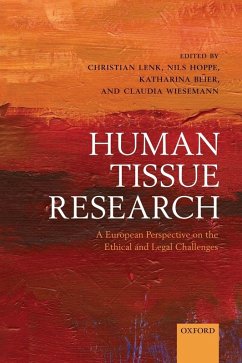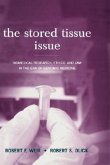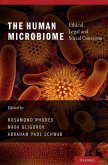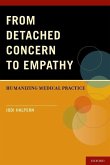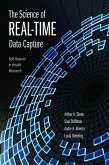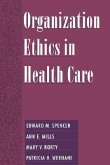Human Tissue Research
Herausgeber: Lenk, Christian; Wiesemann, Claudia; Beier, Katharina; Hoppe, Nils
Human Tissue Research
Herausgeber: Lenk, Christian; Wiesemann, Claudia; Beier, Katharina; Hoppe, Nils
- Gebundenes Buch
- Merkliste
- Auf die Merkliste
- Bewerten Bewerten
- Teilen
- Produkt teilen
- Produkterinnerung
- Produkterinnerung
The use of human tissue for medical research and scientific progress raises many ethical and legal challenges. This multi-authored interdisciplinary text provides a fascinating insight into interlinking research perspectives and serves as a comprehensive reference to the state of play ethically and legally in Europe.
Andere Kunden interessierten sich auch für
![The Stored Tissue Issue The Stored Tissue Issue]() Robert F WeirThe Stored Tissue Issue75,99 €
Robert F WeirThe Stored Tissue Issue75,99 €![Human Microbiome Human Microbiome]() Human Microbiome107,99 €
Human Microbiome107,99 €![From Detached Concern to Empathy From Detached Concern to Empathy]() Jodi HalpernFrom Detached Concern to Empathy48,99 €
Jodi HalpernFrom Detached Concern to Empathy48,99 €![The Science of Real-Time Data Capture The Science of Real-Time Data Capture]() Arthur StoneThe Science of Real-Time Data Capture115,99 €
Arthur StoneThe Science of Real-Time Data Capture115,99 €![When Doctors Become Patients When Doctors Become Patients]() Robert KlitzmanWhen Doctors Become Patients50,99 €
Robert KlitzmanWhen Doctors Become Patients50,99 €![Organization Ethics in Health Care Organization Ethics in Health Care]() Edward M SpencerOrganization Ethics in Health Care94,99 €
Edward M SpencerOrganization Ethics in Health Care94,99 €![Silent Partners Silent Partners]() Rebecca DresserSilent Partners88,99 €
Rebecca DresserSilent Partners88,99 €-
-
-
The use of human tissue for medical research and scientific progress raises many ethical and legal challenges. This multi-authored interdisciplinary text provides a fascinating insight into interlinking research perspectives and serves as a comprehensive reference to the state of play ethically and legally in Europe.
Hinweis: Dieser Artikel kann nur an eine deutsche Lieferadresse ausgeliefert werden.
Hinweis: Dieser Artikel kann nur an eine deutsche Lieferadresse ausgeliefert werden.
Produktdetails
- Produktdetails
- Verlag: Oxford University Press
- Seitenzahl: 216
- Erscheinungstermin: 22. März 2011
- Englisch
- Abmessung: 246mm x 173mm x 18mm
- Gewicht: 544g
- ISBN-13: 9780199587551
- ISBN-10: 0199587558
- Artikelnr.: 33253191
- Herstellerkennzeichnung
- Libri GmbH
- Europaallee 1
- 36244 Bad Hersfeld
- gpsr@libri.de
- Verlag: Oxford University Press
- Seitenzahl: 216
- Erscheinungstermin: 22. März 2011
- Englisch
- Abmessung: 246mm x 173mm x 18mm
- Gewicht: 544g
- ISBN-13: 9780199587551
- ISBN-10: 0199587558
- Artikelnr.: 33253191
- Herstellerkennzeichnung
- Libri GmbH
- Europaallee 1
- 36244 Bad Hersfeld
- gpsr@libri.de
PD Dr Christian Lenk read philosophy, political science, and social anthropology at the University of Hamburg, Germany. From 2000 to 2002 he worked in two projects in the field of medical ethics and bioethics at the Universities of Marburg and Münster, financed by the German Research Community (DFG). He received his doctoral degree for a study on the ethical issues of enhancement technologies in biomedicine at the University of Münster in 2002. In 2002 he became a researcher and since 2004 has been assistant professor for medical ethics at the Department for Medical Ethics and History of Medicine at the University of Göttingen. Nils Hoppe read law, with a specialisation in medical law and human rights, in Nottingham, Erlangen-Nuremberg, Goettingen and Hannover. He completed his doctorate in 2008 with a thesis on property rights in the life sciences. Nils held positions as a legal assistant in a large English law firm, legal counsel in a university hospital and as research fellow in medical ethics. He is now a senior research fellow in health law and ethics as well as co-director of the Centre for Ethics and Law in the Life Sciences (CELLS) at Leibniz Universitaet Hannover. Katharina Beier majored in political science and German language and literature at the University of Greifswald in North-Eastern Germany. In February 2008 she finished her PhD "Between persistence and revision - The biomedical challenge to political liberalism " (Campus 2009). Since April 2008 she has been working as a research fellow and Project Officer for the Tiss.EU project at the Department of Medical Ethics and History in Göttingen (Germany). Her research interests comprise modern liberal theories, liberal biopolitics, questions of biomedical/genetic justice, utilitarianism as well as ethical and legal aspects of biobanks. Claudia Wiesemann is a medical ethicist and head of the Department of Medical Ethics and History of Medicine at Göttingen University Medical School, Germany. She is also President of the German Academy of Ethics in Medicine, an academic society for Medical Ethics. In 1995, she completed her habilitation in medical history and medical ethics at the University of Erlangen-Nuernberg, Germany. Her dissertation in medical history at Muenster University, Germany, was published in 1991. She has completed all medical exams in Muenster University, Germany, in 1985 and has worked as resident from 1986 to 1988. Claudia Wiesemann has coordinated several European research projects, e.g., on the ethics of tissue research and on information and documentation networks in ethics in medicine and biotechnology. Her research focuses on the ethics of research with humans, reproductive medicine and the family. She serves as an editorial board member of several journals in the field of medical humanities.
* Preface: Introduction by the editors
* 1 - Key concepts of the ethical debate
* 1: Y. Michael Barilan: The biomedical uses of the body: lessons from
the history of human rights and dignity
* 2: Rieke van der Graaf and Johannes J. M. van Delden: Exploring an
alternative for informed consent in biobank research
* 3: Austen Garwood-Gowers: Respect as a precondition for use of human
tissue for research purposes
* 4: Nils Hoppe: Risky business - re-evaluating participant risk in
biobanking
* 5: Nadja K. Kanellopoulou: Reciprocity, trust, and public interest in
research biobanking: in search for a balance
* 6: Christian Lenk: Taking solidarity seriously: do biobank
institutions have a moral obligation to inform their patients on
incidental health findings?
* 7: Katharina Beier: Beyond the dichotomy of individualism and
solidarity: participation in biobank research in Sweden and Norway
* 2 - The legal regulation of human tissue research
* 8: José Miola: Law, ethics, and human tissue research - integration
or competition?
* 9: Remigius N. Nwabueze: Legal paradigms of human tissues
* 10: Bianka S. Dörr: Research with human biological material and
personal data in biobanks - legal and regulatory framework in
Switzerland
* 11: Virginie Commin: Legal issues surrounding French research-focused
biobanks
* 12: Antonio G. Spagnolo, Viviana Daloiso and Lara Parente: Biobanks:
ethical and legal aspects of the collection and storage of human
biological material in Italy
* 13: Jasper Bovenberg: How to achieve 'free movement of tissue' in the
EU research area
* 3 - Practices - disciplinary perspectives
* 14: Christoph Brochhausen, Nabila Ahmed, Nicolas Roßricker and C.
James Kirkpatrick: Ethical recommendations for the use of human
biological material stored in pathology archives for research
purposes
* 15: Leen Trommelmans, Joseph Selling and Kris Dierickx: Informed
consent when donating cells for the production of human tissue
engineered products
* 16: Susanne Weber, Dana Wilson-Kovacs and Christine Hauskeller: The
regulation of autologous stem cells in heart repair: comparing the UK
and Germany
* 17: Milena D. Bister: Discovering informed consent: a case study on
the practice of informed consent to tissue donation in Austria
* Epilogue: Conclusions and future prospects from the articles of the
present volume by the editors
* 1 - Key concepts of the ethical debate
* 1: Y. Michael Barilan: The biomedical uses of the body: lessons from
the history of human rights and dignity
* 2: Rieke van der Graaf and Johannes J. M. van Delden: Exploring an
alternative for informed consent in biobank research
* 3: Austen Garwood-Gowers: Respect as a precondition for use of human
tissue for research purposes
* 4: Nils Hoppe: Risky business - re-evaluating participant risk in
biobanking
* 5: Nadja K. Kanellopoulou: Reciprocity, trust, and public interest in
research biobanking: in search for a balance
* 6: Christian Lenk: Taking solidarity seriously: do biobank
institutions have a moral obligation to inform their patients on
incidental health findings?
* 7: Katharina Beier: Beyond the dichotomy of individualism and
solidarity: participation in biobank research in Sweden and Norway
* 2 - The legal regulation of human tissue research
* 8: José Miola: Law, ethics, and human tissue research - integration
or competition?
* 9: Remigius N. Nwabueze: Legal paradigms of human tissues
* 10: Bianka S. Dörr: Research with human biological material and
personal data in biobanks - legal and regulatory framework in
Switzerland
* 11: Virginie Commin: Legal issues surrounding French research-focused
biobanks
* 12: Antonio G. Spagnolo, Viviana Daloiso and Lara Parente: Biobanks:
ethical and legal aspects of the collection and storage of human
biological material in Italy
* 13: Jasper Bovenberg: How to achieve 'free movement of tissue' in the
EU research area
* 3 - Practices - disciplinary perspectives
* 14: Christoph Brochhausen, Nabila Ahmed, Nicolas Roßricker and C.
James Kirkpatrick: Ethical recommendations for the use of human
biological material stored in pathology archives for research
purposes
* 15: Leen Trommelmans, Joseph Selling and Kris Dierickx: Informed
consent when donating cells for the production of human tissue
engineered products
* 16: Susanne Weber, Dana Wilson-Kovacs and Christine Hauskeller: The
regulation of autologous stem cells in heart repair: comparing the UK
and Germany
* 17: Milena D. Bister: Discovering informed consent: a case study on
the practice of informed consent to tissue donation in Austria
* Epilogue: Conclusions and future prospects from the articles of the
present volume by the editors
* Preface: Introduction by the editors
* 1 - Key concepts of the ethical debate
* 1: Y. Michael Barilan: The biomedical uses of the body: lessons from
the history of human rights and dignity
* 2: Rieke van der Graaf and Johannes J. M. van Delden: Exploring an
alternative for informed consent in biobank research
* 3: Austen Garwood-Gowers: Respect as a precondition for use of human
tissue for research purposes
* 4: Nils Hoppe: Risky business - re-evaluating participant risk in
biobanking
* 5: Nadja K. Kanellopoulou: Reciprocity, trust, and public interest in
research biobanking: in search for a balance
* 6: Christian Lenk: Taking solidarity seriously: do biobank
institutions have a moral obligation to inform their patients on
incidental health findings?
* 7: Katharina Beier: Beyond the dichotomy of individualism and
solidarity: participation in biobank research in Sweden and Norway
* 2 - The legal regulation of human tissue research
* 8: José Miola: Law, ethics, and human tissue research - integration
or competition?
* 9: Remigius N. Nwabueze: Legal paradigms of human tissues
* 10: Bianka S. Dörr: Research with human biological material and
personal data in biobanks - legal and regulatory framework in
Switzerland
* 11: Virginie Commin: Legal issues surrounding French research-focused
biobanks
* 12: Antonio G. Spagnolo, Viviana Daloiso and Lara Parente: Biobanks:
ethical and legal aspects of the collection and storage of human
biological material in Italy
* 13: Jasper Bovenberg: How to achieve 'free movement of tissue' in the
EU research area
* 3 - Practices - disciplinary perspectives
* 14: Christoph Brochhausen, Nabila Ahmed, Nicolas Roßricker and C.
James Kirkpatrick: Ethical recommendations for the use of human
biological material stored in pathology archives for research
purposes
* 15: Leen Trommelmans, Joseph Selling and Kris Dierickx: Informed
consent when donating cells for the production of human tissue
engineered products
* 16: Susanne Weber, Dana Wilson-Kovacs and Christine Hauskeller: The
regulation of autologous stem cells in heart repair: comparing the UK
and Germany
* 17: Milena D. Bister: Discovering informed consent: a case study on
the practice of informed consent to tissue donation in Austria
* Epilogue: Conclusions and future prospects from the articles of the
present volume by the editors
* 1 - Key concepts of the ethical debate
* 1: Y. Michael Barilan: The biomedical uses of the body: lessons from
the history of human rights and dignity
* 2: Rieke van der Graaf and Johannes J. M. van Delden: Exploring an
alternative for informed consent in biobank research
* 3: Austen Garwood-Gowers: Respect as a precondition for use of human
tissue for research purposes
* 4: Nils Hoppe: Risky business - re-evaluating participant risk in
biobanking
* 5: Nadja K. Kanellopoulou: Reciprocity, trust, and public interest in
research biobanking: in search for a balance
* 6: Christian Lenk: Taking solidarity seriously: do biobank
institutions have a moral obligation to inform their patients on
incidental health findings?
* 7: Katharina Beier: Beyond the dichotomy of individualism and
solidarity: participation in biobank research in Sweden and Norway
* 2 - The legal regulation of human tissue research
* 8: José Miola: Law, ethics, and human tissue research - integration
or competition?
* 9: Remigius N. Nwabueze: Legal paradigms of human tissues
* 10: Bianka S. Dörr: Research with human biological material and
personal data in biobanks - legal and regulatory framework in
Switzerland
* 11: Virginie Commin: Legal issues surrounding French research-focused
biobanks
* 12: Antonio G. Spagnolo, Viviana Daloiso and Lara Parente: Biobanks:
ethical and legal aspects of the collection and storage of human
biological material in Italy
* 13: Jasper Bovenberg: How to achieve 'free movement of tissue' in the
EU research area
* 3 - Practices - disciplinary perspectives
* 14: Christoph Brochhausen, Nabila Ahmed, Nicolas Roßricker and C.
James Kirkpatrick: Ethical recommendations for the use of human
biological material stored in pathology archives for research
purposes
* 15: Leen Trommelmans, Joseph Selling and Kris Dierickx: Informed
consent when donating cells for the production of human tissue
engineered products
* 16: Susanne Weber, Dana Wilson-Kovacs and Christine Hauskeller: The
regulation of autologous stem cells in heart repair: comparing the UK
and Germany
* 17: Milena D. Bister: Discovering informed consent: a case study on
the practice of informed consent to tissue donation in Austria
* Epilogue: Conclusions and future prospects from the articles of the
present volume by the editors

